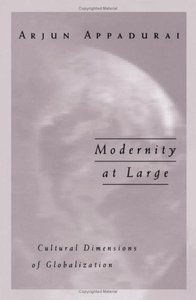Modernity at LargeCultural Dimensions of Globalization
|

|
 Diese Seite wurde seit 1 Jahr inhaltlich nicht mehr aktualisiert.
Unter Umständen ist sie nicht mehr aktuell.
Diese Seite wurde seit 1 Jahr inhaltlich nicht mehr aktualisiert.
Unter Umständen ist sie nicht mehr aktuell.
 Zusammenfassungen
Zusammenfassungen
 Appadurai's book, Modernity at Large, offers quite a few tools to help us think about that big fuzzy thing called "globalization." He coins quite a few words to describe multiply-constituted networks of culture - ethnoscapes, mediascapes, ideoscapes, financescapes, and technoscapes. All are different ways of looking at the global cultural flows that we're trying to describe, and all are strongly influenced by perspective, overlapping, and rapidly shifting (though the term doesn't quite capture the instability and mutability of global cultural flows).
Appadurai's book, Modernity at Large, offers quite a few tools to help us think about that big fuzzy thing called "globalization." He coins quite a few words to describe multiply-constituted networks of culture - ethnoscapes, mediascapes, ideoscapes, financescapes, and technoscapes. All are different ways of looking at the global cultural flows that we're trying to describe, and all are strongly influenced by perspective, overlapping, and rapidly shifting (though the term doesn't quite capture the instability and mutability of global cultural flows).
A book like this, to be useful, should help us think about important problems in manageable, intelligible, and useful ways. Appadurai's book offers more than most in this line. His terms, such as the above, are interesting, and his willingness to theorize as well as analyze is valuable. The ways that he situates himself in his analysis is also illuminating and useful. For example, Appadurai describes a trip he and his wife made to a Hindu temple in Bombay. His wife asked about a Hindu priest that she had known before, and they were told that he was in Houston. The point isn't just that they went there and he came here. He's talking about trans-locality, and the production of locality beyond mere connection to a place. Not all Hindus live in India, and not all Indians have to live in India to maintain their Indian-ness. At the same time, Houston is Houston because of both the people and the landscape located there. But part of its identity as a place derives from the trans-local identities of some of its citizens - a "cosmopolitan" city where some citizens are both Indian and American. He does a better job than I'm doing here explaining his thinking about the contemporary experience of diaspora, which is an accomplishment in itself.
There are some flashes of real insight in this text - for me, some of his coinages were brilliant, and the comment that some trans-local modern ethnicities are forced into violent anti-statism through an inability to articulate their identity except through the language of nation and state also resonates - but overall, Appadurai tried to accomplish too much in one book. He finds himself saying things like "the details of this argument are beyond the scope of this chapter," and it seems like this happens too much. It would have been better to flesh out his thinking about the production of locality in greater detail, with more case studies. And some of his terms could use additional explanation - he doesn't seem to notice his own un-critical use of the term "cosmopolitan," and he pays remarkably little attention to literature and film after professing the importance of both in the global exchange of ideas (mediascapes and ideoscapes, as he calls them).
This is a strong book, with some real value, but I wouldn't recommend reading the whole thing all the way through. The table of contents, the index, and the chapter titles are useful signposts. It's the kind of book that might be most useful in small doses.
 Dieses Buch erwähnt ...
Dieses Buch erwähnt ...
 Zitationsgraph
Zitationsgraph
 Zitationsgraph (Beta-Test mit vis.js)
Zitationsgraph (Beta-Test mit vis.js)
 5 Erwähnungen
5 Erwähnungen 
- Jahrbuch Medienpädagogik 7 (Heinz Moser, Werner Sesink, Dorothee M. Meister, Brigitte Hipfl, Theo Hug) (2008)

- Hanging Out, Messing Around, and Geeking Out - kids living and learning with new media (Mizuko Ito, Sonja Baumer, Matteo Bittanti, danah boyd, Rachel Cody, Becky Herr-Stephenson, Heather Horst, Patricia G. Lange, Dilan Mahendran, Katynka Z. Martínez, C.J. Pascoe, Dan Perkel, Laura Robinson, Christo Sims, Lisa Tripp) (2010)



- Digital Exposure - Postmodern Postcapitalism (Raphael Sassower) (2013)

- The Charisma Machine - The Life, Death, and Legacy of One Laptop per Child (Morgan Ames) (2019)

- Postdigital Disconnects - The Discursive Formation of Technology in Education (Marion Mathier) (2023)
- 1. Introduction
 Co-zitierte Bücher
Co-zitierte Bücher

How Big Media Uses Technology and the Law to Lock Down Culture and Control Creativity
(Lawrence Lessig) (2004)


Confronting the Challenges of Participatory Culture
Media Education for the 21st Century
(Henry Jenkins, Katie Clinton, Ravi Purushotma, Alice J. Robison, Margaret Weigel) (2006)



Living and Learning with New Media
Summary of Findings from the Digital Youth Project
(Mizuko Ito, Heather Horst, Matteo Bittanti, danah boyd, Becky Herr-Stephenson, Patricia G. Lange, C.J. Pascoe, Laura Robinson) (2008)

 Volltext dieses Dokuments
Volltext dieses Dokuments
 Bibliographisches
Bibliographisches 
 Beat und dieses Buch
Beat und dieses Buch
Beat hat dieses Buch während seiner Zeit am Institut für Medien und Schule (IMS) ins Biblionetz aufgenommen. Beat besitzt kein physisches, aber ein digitales Exemplar. (das er aber aus Urheberrechtsgründen nicht einfach weitergeben darf). Aufgrund der wenigen Einträge im Biblionetz scheint er es nicht wirklich gelesen zu haben. Es gibt bisher auch nur wenige Objekte im Biblionetz, die dieses Werk zitieren.













 , 2692 kByte)
, 2692 kByte) 

 Biblionetz-History
Biblionetz-History